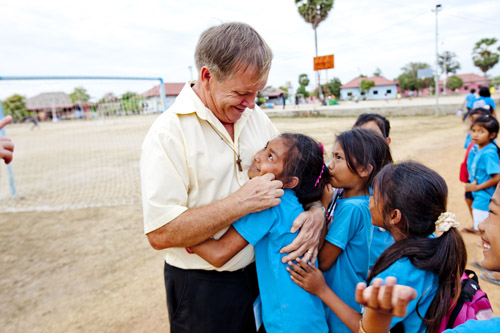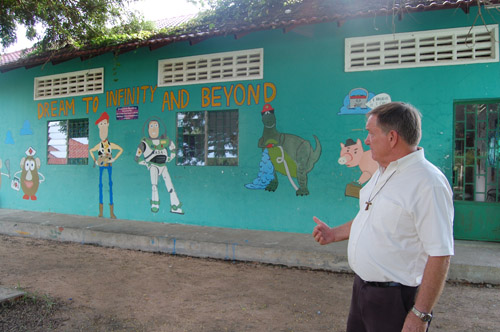 John and Kathy Tucker at the New Hope VillageIn 2000, two years after Cambodia emerged from over 30 years of warfare that had left it destabilized and with little healthcare infrastructure, John and Kathy Tucker traveled there from their home in the U.S. state of Texas to work with people living with HIV. In 2006, the couple founded New Hope for Cambodian Children in a village in the Kondal Province, near Phnom Penh. New Hope provides housing, medical care, and education for HIV-positive orphans living in the village and has additional support programs for HIV-positive children and youth living with family members in neighboring villages. New Hope is a founding member of the TREAT Asia Pediatric Network.
John and Kathy Tucker at the New Hope VillageIn 2000, two years after Cambodia emerged from over 30 years of warfare that had left it destabilized and with little healthcare infrastructure, John and Kathy Tucker traveled there from their home in the U.S. state of Texas to work with people living with HIV. In 2006, the couple founded New Hope for Cambodian Children in a village in the Kondal Province, near Phnom Penh. New Hope provides housing, medical care, and education for HIV-positive orphans living in the village and has additional support programs for HIV-positive children and youth living with family members in neighboring villages. New Hope is a founding member of the TREAT Asia Pediatric Network.
TREAT Asia Report: Why did you come to Cambodia?
Kathy Tucker: We have seven kids between us, and they had all left to go to college, and there we were alone in our big house in Texas, and we said, ‘Okay, what do we do with the rest of our lives?’
John Tucker: We knew Cambodia had been devastated by war and genocide, and we knew of some groups that were working here and trying to do some good things. So we came with one of them, a missionary group out of New York, to work in a hospice with adults living with HIV. I had never personally met anyone with HIV before that.
We discovered there was very little medicine in the country at that time, and the people were dying in the hospice and their children who were infected with the virus had nowhere to go. The villages wouldn’t accept them. Their extended families wouldn’t accept them. So we raised some money, imported some antiretroviral therapy (ART), and opened a clinic. Then in 2005, the Clinton Foundation partnered with us and started providing the treatment.
In 2006, we left to form New Hope so that we could expand to the provinces. Currently, we have approximately 210 children living here in our village, 40 children who used to live here who are attending university or vocational training in Phnom Penh, and approximately 1,400 children who live with their parents or extended families and receive home-based care from us.
In this video, John and Kathy Tucker, co-founders of New Hope for Cambodian Children, discuss their programs for HIV-positive orphans and why they came to Cambodia to combat HIV.
TA Report: Could you describe your program and what the kids’ lives are like here?
John: We have eight housing clusters that include bedrooms for the kids and for their caregivers. We provide schooling from grades one through eight. We used to just provide for one through four, but we expanded this year. Our curriculum is in English with one hour of Khmer, the Cambodian language, every day, and we have 14 expatriate, native English-speaking teachers who live on site.
Kathy: We sent our first kids to university in Phnom Penh, and we realized how far behind they were in English, and we figured if we had our own school for the higher grades, then that would give them a head start.
John: The local schools in provincial areas don’t have many resources and can be weak, and our children are going to have to fight stigma and discrimination in Cambodia, so they have to have the best education they can have.
We also have a clinic on site that’s staffed with a nurse, and we have a doctor who visits the clinic once a week. We used to have a full-time doctor, but we don’t need one anymore because all the kids are on medication and very healthy. Most have undetectable viral loads. They are just healthy kids running around and playing and getting scrapes and cuts.
Kathy: And if something does happen, there’s a hospital nearby where we can send them, where they are now able to get better care than we can provide here.

John Tucker greets several of the children after they finish classes for the day. (Photo: Kevin Tachman)
TA Report: What services do you provide to the kids living with their families in the surrounding villages?
John: We were told by a doctor at the nearby hospital that the biggest reason people don’t come in for their medicine is they don’t have the money for transportation, so we provide that. We provide them with food if they need it. And if they’re not in school, we get them back in school. We have staff that do weekly home visits. They check their grades and attendance at the local school, count their pills to make sure they’re taking their medication, and provide counseling.
TA Report: Could you describe your transitional program for the young adults living in Phnom Penh?
John: We pay all their fees and house them until they graduate from university or vocational training. We also give them a lot of social support to help them transition from living here, where everything’s provided for you, to living on your own. The house they live in in Phnom Penh is the beginning of that process. They have to do their own laundry and get themselves to school, but there’s a lady who locks the place up at night.
The medical transition is a little harder. Pediatric doctors spend a little more time with kids and have known them for years. They’ve watched these kids who were often very sick get healthy, and they form a relationship with them. Now they’re going to the adult program, where there’s less doctor time with each patient and where they expect adults to be adults. We have a couple of clinics in Phnom Penh that we trust quite a bit, and we transfer them to adult care there.
We are also learning things about helping them deal with stigma. Should you tell people you have HIV? How do you disclose to your friends? How do you disclose to the guy you’re dating? Our kids have lived in a bubble here, where everybody has HIV and everybody accepts HIV. Now they’re in the real world, and the bubble has burst. We’ve done everything we can to try to prepare them, but it still slaps you in the face. But the children know if everything goes wrong and they’re unemployed and hungry, they have a place to come to.
Kathy: Always.
John: This is home. This is their village. We call it our village, not meaning Kathy’s and John’s, meaning it belongs to the children. We had a girl who graduated this year in accounting. She’s already got a job at a local business, and she will stay with us for three months until she saves some money. She’s 22 years old, and now she’s independent. She’s one of our early children who we started on medication when nobody in Cambodia was providing it.
.jpg)
A twelfth grade student at New Hope who plans to attend university and study medicine.
TA Report: How has being a member of TREAT Asia impacted your work?
Kathy: TREAT Asia has been a great help. Whenever we come across something, and we think, ‘Oh my gosh, how do we handle this,’ we always call Annette [Annette Sohn, pediatrician and amfAR vice president and director of TREAT Asia], and we find out what we should do medically.
John: We have a little boy here who is resistant to first- and second-line antiretroviral therapy. We sent an email to Annette asking where we could get third-line treatment, which is extremely expensive in Cambodia. And she helped us get a compassionate donation. When he came here he was eight years old, and he weighed 16 pounds.
Kathy: Now he’s in first grade, and he gets in trouble all the time.
John: Also, the ability to talk to other people in the TREAT Asia Network also dealing with children with HIV is really helpful. We’ve learned a lot. And we’ve also attended TREAT Asia workshops about adolescent care and brought our staff. They learned a lot and brought it back here and put it to work, especially information about how to talk to the children about sexuality. Cambodians don’t talk about sex a lot, so we picked up some good pointers.
TA Report: Today, more than two-thirds of people living with HIV in Cambodia have access to ART, which is one of the highest treatment access rates in the region. How has the national response to HIV changed since your arrival?
John: The Cambodian government is one of the success stories, and I think credit needs to be given where credit is due. Dr. Mean Chhi Vun, director of Cambodia's National Center for HIV/AIDS, Dermatology and STDs, is a member of the TREAT Asia network, and he has worked hard to get people who need ART access to it and scaled up the response very, very quickly.
And because parents are getting the medicine on time, they’re not dying, so the number of children coming to us is decreasing. We used to have a house with 17 cribs in it, but we don’t have any babies right now. Prevention of mother-to-child transmission is working beautifully in Cambodia. We are getting older children though. I personally think there’s another tsunami coming because there’s no third-line ART in the country. I’m afraid many parents who have resistance to first- and second-line ART are doing to die, and we’re going to get more children. The villages are still afraid of the children and still won’t take them. I think stigma and discrimination is still pretty strong because there’s still a lack of education.

John Tucker outside one of New Hope’s classroom buildings.
TA Report: What’s next for New Hope?
John: Well, we are working more and more on helping the kids transition into vocations, so we’re probably going to open a bakery because we have a couple of boys who have learned to be bakers. Other than that, it’s hard to say.
Kathy: We don’t know what the next challenge will be yet.
John: But hopefully, ten years from now we won’t need this place. Our youngest is in first grade, so maybe…